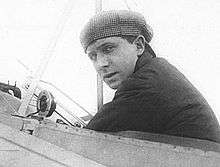Jorge Chávez
- For the jockey, see: Jorge F. Chavez
- For other possible meanings see Chávez (disambiguation)
| Jorge Chávez | |
|---|---|
 | |
| Born |
January 13, 1887 Paris, France |
| Died |
September 27, 1910 (aged 23) Domodossola, Italy |
| Nationality | Peruvian |
| Occupation | Aviator |
| Parent(s) |
Manuel Chávez Moreyra María Rosa Dartnell y Guisse |
Jorge Chávez Dartnell (January 13, 1887 – September 27, 1910), also known as Géo Chávez, was a Peruvian aviator. At a young age, he achieved fame for his aeronautical feats. He died in 1910 while attempting the first air crossing of the Alps.
Early life
Jorge Chávez Dartnell was born in Paris, France to Peruvian parents Manuel Chávez Moreyra and María Rosa Dartnell y Guisse. He studied at the Violet School from where he graduated with an engineer's degree in 1908.[1]
Career
Chávez attended the school of aviation established by Henry and Maurice Farman where he got his pilot license and undertook his first flight in Reims on February 28, 1910.[2] Afterwards he participated in several aviation competitions throughout France and other European countries. On August 8 of the same year he took a Blériot monoplane to Blackpool, England where he achieved fame after attaining an altitude of 1,647 meters (5,405 ft).[3] He improved his mark by flying at 2,700 meters (8,700 ft) over the city of Issy, France on September 6.[4]
Death
After this successful series, Chávez decided to undertake the first air crossing of the Alps. This attempt was made in response to a prize of $20,000 offered by the aero club of Italy for the first aviator to make the trip alive.[5] After several delays due to bad weather, he took off from Ried-Brig, Switzerland on September 23, 1910, and made his way through the Simplon Pass. Before departing he said, "Whatever happens, I shall be found on the other side of the Alps".[6] Fifty-one minutes later he arrived to his destination, the city of Domodossola, Italy, but his plane crashed upon landing. It is believed that the airplane had been damaged previously and inadequately repaired, which caused the aircraft to break under the heavy winds of the mountains.[7] Heavily injured but conscious, Chávez agonized for four days before dying of massive blood loss.[8] His last words were, "Higher. Always higher." according to the testimony of his friend and fellow aviator Juan Bielovucic.[9]
Legacy
The death of Jorge Chávez caused great commotion in the aviation world. Brig and Domodossola, the start and end points of his last flight, dedicated monuments to the lost aviator. In Peru, Chávez became an icon for aviation related institutions such as the Air Force. His remains were initially buried in France but repatriated to Peru in 1957, where they currently rest at the Officer's School of the Peruvian Air Force at Las Palmas.[10] The International Airport of Lima, inaugurated in 1960, is named after him. A life-sized replica of Chávez famous Blériot XI monoplane is still on display at the air terminal.
He appears as a character in scenes drawing upon his real-life tragic flight over the Alps in John Berger's novel G. (1972), awarded the Booker Prize in 1972.
Gallery
- Monument to Jorge Chávez in Lima, Perú
- Memorial to Jorge Chávez in the market square of Brigue
- Monument to Jorge Chávez in Domodossola
 Monument to Jorge Chávez in Brigue
Monument to Jorge Chávez in Brigue
See also
Notes
- ↑ Museo Aeronáutico del Perú, Jorge Chávez. Retrieved on May 30, 2007.
- ↑ Alberto Tauro del Pino, Enciclopedia Ilustrada del Perú, vol. IV, p. 607.
- ↑ John Warth, "Adventurers of the Air". Retrieved on May 30, 2007.
- ↑ Jorge Basadre, Historia de la República del Perú, vol. VIII, p. 383.
- ↑ John Warth, "Adventurers of the Air". Retrieved on May 30, 2007.
- ↑ John Warth, "Adventurers of the Air". Retrieved on May 30, 2007.
- ↑ Jorge Basadre, Historia de la República del Perú, vol. VIII, p. 384.
- ↑ Jorge Basadre, Historia de la República del Perú, vol. VIII, pp. 384-385.
- ↑ Jorge Basadre, Historia de la República del Perú, vol. VIII, p. 384.
- ↑ Jorge Basadre, Historia de la República del Perú, vol. VIII, p. 385.
Bibliography
- (in Spanish) Basadre, Jorge. Historia de la República del Perú. Lima: Editorial Universitaria, 1983.
- (in Spanish) Museo Aeronáutico del Perú. Jorge Chávez.
- (in Spanish) Tauro del Pino, Alberto. Enciclopedia Ilustrada del Perú. Lima: Peisa, 2003.
- Warth, John. "Adventurers of the Air". In Whitney, Caspar (Editor). Collier’s Aviation Pioneers. 1911.
External links
- (in English) (in Spanish) (in Italian) (in French) Jorge Chavez complete Biography
- (in Spanish) Biography
- (in English) Jorge Chávez at EarlyAviators.com